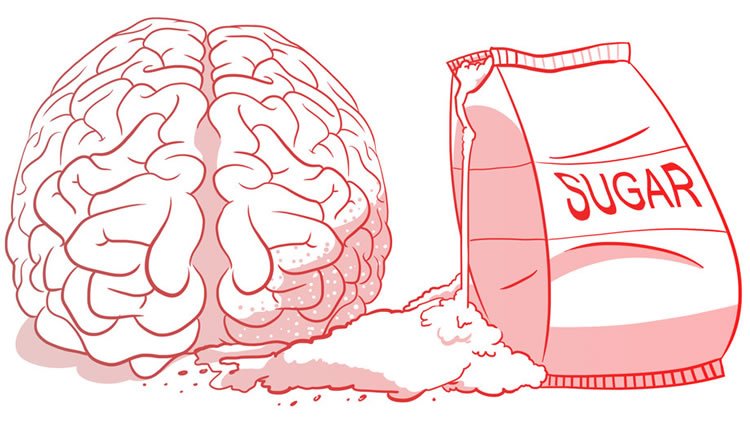We love sweet treats like we love our instant loans. Be that as it may, an excess of sugar in our eating regimens can prompt weight gain and heftiness, Type 2 diabetes and dental rot. We realize we ought not be eating sweets, frozen yogurt, treats, cakes and drinking sugary soft drinks, yet now and again they are so difficult to stand up to. Although we know that sometimes sweets affect the female as ed medications indianapolis, they’re not so healthy for our body.
Maybe our brain is designed to need these food sources.
As a neuroscientist, my examination focuses on how present-day “obesogenic,” or weight advancement, eats less carbs changes the brain. I need to comprehend how what we eat modifies our way of behaving and whether brain changes can be relieved by another way of life factors.
Your body runs on sugar — glucose to be exact. Glucose comes from the Greek word glukos which implies sweet. Glucose fills the cells that make up our body — including brain cells (neurons).
Dopamine “hits” from eating sugar
On a transformative premise, our crude predecessors were foragers. Sugary food varieties are fantastic wellsprings of energy, so we have advanced to find sweet food varieties especially pleasurable. Food sources with undesirable, unpleasant and sharp preferences can be unripe, toxic or decaying — causing disorder.
So to boost our endurance as an animal varieties, we have an intrinsic brain framework that makes us like sweet food sources since they’re an incredible wellspring of energy to fuel our bodies.
At the point when we eat sweet food sources the brain’s award framework — called the mesolimbic dopamine framework — gets enacted. Dopamine is a brain substance delivered by neurons and can flag that an occasion was positive. At the point when the award framework fires, it builds up ways of behaving — making it almost certain for us to complete these activities once more.
Dopamine “hits” from eating sugar elevate quick figuring out how to find a greater amount of these food sources specially.

Our current circumstance today is bountiful with sweet, energy rich food varieties. We never again need to search for these exceptional sugary food sources — they are accessible all over the place. Sadly, our brain is still practically basically the same as our predecessors, and it truly prefers sugar. So what occurs in the brain when we exorbitantly consume sugar?
If you’re already renting a car with the help of EKO car rental and heading to the first candy store, we suggest you go to the first market where you’ll buy fruits and vegetables.
Could sugar overhaul the brain?
The brain constantly rebuilds and overhauls itself through an interaction called brain adaptability. This overhauling can occur in the award framework. Rehashed initiation of the award pathway by drugs or by eating loads of sugary food varieties makes the brain adjust to visit feeling, prompting a kind of resilience.
On account of sweet food varieties, this implies we really want to eat more to get a similar compensating feeling — an exemplary component of dependence.
Consistently eating high-sugar food sources can intensify desires.
Food fixation is a questionable subject among researchers and clinicians. While it is actually the case that you can turn out to be genuinely reliant upon specific medications, it is discussed whether you can be dependent on food when you really want it for getting through one day to the next.
The brain needs sugar, then, at that point, more sugar
No matter what our requirement for food to control our bodies, many individuals experience food desires, especially when pushed, ravenous or just confronted with an appealing showcase of cakes in a bistro.
To oppose desires, we really want to repress our regular reaction to enjoy these delectable food sources. An organization of inhibitory neurons is basic for controlling way of behaving. These neurons are moved in the prefrontal cortex — a vital region of the brain associated with navigation, motivation control and postponing satisfaction.
If you’re involved in the production and sale of sweets, consider whether it’s time to sell your business.

Inhibitory neurons resemble the brain’s brakes and delivery the synthetic GABA. Research in rodents has shown that eating high-sugar diets can change the inhibitory neurons. The sugar-took care of rodents were additionally less ready to control their way of behaving and simply decide.
Critically, this shows that what we eat can impact our capacity to oppose enticements and may underlie why diet changes are so challenging for individuals.
A new report requested that individuals rate the amount they needed to eat unhealthy nibble food sources when they were feeling hungry versus when they had as of late eaten. Individuals who consistently ate a high-fat, high-sugar diet appraised their desires for nibble food varieties higher in any event, when they weren’t eager.
This proposes that consistently eating high-sugar food sources could intensify desires — making an endless loop of needing increasingly more of these food sources. Sugar can upset memory arrangement
One more brain region impacted by high sugar eats less carbs is the hippocampus — a key memory community.
The sugar-incited changes in the hippocampus were both a decrease of infant neurons, which are essential for encoding recollections, and an expansion in synthetic compounds connected to aggravation.
How to shield your brain from sugar?
The World Health Organization educates that we limit our admission with respect to added sugars to five percent of our day-to-day calorie consumption, which is 25g (six teaspoons).
Taking into account the typical Canadian grown-up consumes 85g (20 teaspoons) of sugar each day, this is a major eating routine change for some. Critically, the’s brain adaptability abilities permit it to reset to a degree following eliminating dietary sugar, and actual activity can expand this interaction. Food varieties rich in omaga-3 fats (found in fish oil, nuts and seeds) are additionally neuroprotective and can help brain synthetic substances expected to shape new neurons.
While it’s difficult to get out from under propensities like continuously eating sweet or making your espresso a twofold, your brain will thank you for making positive advances.
The initial step is frequently the hardest. These eating routine changes can frequently get simpler en route.
If after reading this you agree on not buying anymore sweets for your husband you should consider buying our ring bearer gifts instead.
